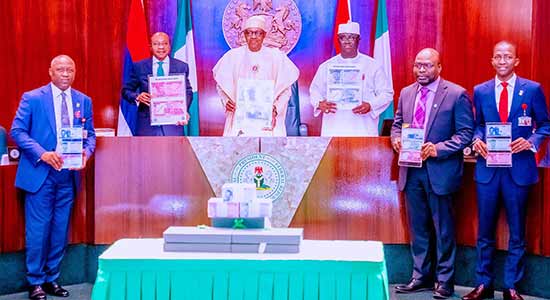Godwin Emefiele, the governor of the Central Bank of Nigeria, has stated that the bank will cooperate with law enforcement organisations like the Independent Corrupt Practices and Other Related Offences Commission and the Economic and Financial Crimes Commission to make tracking and complicating large withdrawals more difficult.

The amount of money that can be withdrawn from the counter will be significantly reduced, according to Emefiele, who told the press after the launch of the new Naira banknotes in Abuja on Wednesday. He also added that bulk withdrawals would require a number of procedures and security checks to track use.

He claimed that doing so would guarantee a smooth transition to a cashless society.
Along with the newly designed notes, he added, this action would ensure that the apex bank has adequate control over the amount of money in circulation.
READ ALSO: Marketers Get Petrol At Depots For More Than N200 Per Litre, Says IPMAN
The CBN Governor added that no one is specifically targeted by the latest action while pointing out that previous attempts to redesign naira notes met with resistance.
“There is no economy imbued with the thinking that it has to be a cash economy; the world has moved from predominantly cash to a cashless economy. And I think Nigeria and the Central Bank of Nigeria are prepared to move towards a cashless economy. And that is why following the redesign and issuance of this note, we will insist that cashless will be nationwide.
“We will restrict the volume of cash that people can withdraw over the counter. If you need to draw large volumes of cash, you will fill out uncountable forms; we will take your data, whether it’s your BVN or NIN so that our law enforcement agencies like EFCC and ICPC can follow you and be sure that you are taking that money for a good purpose.”
“The Central Bank of Nigeria, by law, has the mandate to reissue and redesign currency for the country, and for Nigerian people, every five to eight years. And I want to hope that after the event of today, the Central Bank of Nigeria can take it as part of its programmes to see that the currencies are designed or reissued every five to eight years.
“It is mainly because the central bank should be able to control the size of currency in circulation fully. That is the actual mandate of the Central Bank of Nigeria because it has implications for monetary policy management in the country.
“There is no need for anybody to think this program is targeted at anyone. Like you heard the President, he said, this discussion to redesign and reissue currency started early in the year.”
The existing currency, the naira notes, has been in use for almost 20 years, according to President Muhammadu Buhari, therefore a change is long needed.
This was in line with his claim that the recently revised notes have special security features that make them challenging to forge.
This was said by Buhari when he unveiled the new Naira banknotes in the State House’s council room in Abuja, just before the start of this week’s Federal Executive Council meeting.
In a statement released by Buhari’s special adviser on media and publicity, Femi Adesina, Buhari also expressed his happiness that the locally made Nigerian Security Printing and Minting PLC manufactured the redesigned banknotes.
The President made a point of stating that it is standard practise for central banks and national governments to release new or updated currency notes every five to eight years when speaking during the unveiling of the new banknotes.
He bemoaned the fact that it had been nearly 20 years since the nation’s local currency underwent a significant overhaul.
‘‘This implies that the Naira is long overdue to wear a new look.
“A cycle of banknote redesign is generally aimed at achieving specific objectives, including but not limited to: improving the security of banknotes, mitigating counterfeiting, preserving the collective national heritage, controlling currency in circulation, and reducing the overall cost of currency management,” he said.



















